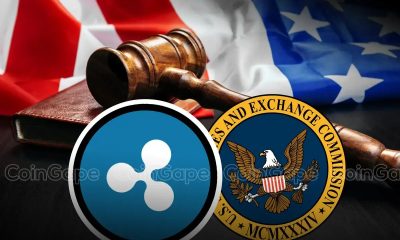Regulation
Elon Musk Under Fire As US SEC Moves For Sanctions In Twitter Probe

The U.S. Securities and Exchange Commission (SEC) has intensified its legal battle against Elon Musk, Tesla CEO and SpaceX, by seeking sanctions after he failed to appear for court-ordered testimony related to the agency’s investigation into his $44 billion acquisition of Twitter, now rebranded as X. The SEC’s actions could have serious legal ramifications for Musk, including potential civil penalties or further court orders.
Elon Musk Under Fire As US SEC Moves For Sanctions
The SEC has requested that a federal court issue an order compelling Musk to explain why he should not be held in civil contempt. According to a recent court filing, Musk informed the SEC only three hours before the scheduled hearing on September 10 that he would not attend, citing an emergency.
Subsequently, the SEC stated that Musk’s actions violated a May 31 court order that mandated his testimony, describing his last-minute decision as an attempt to evade legal obligations.
The Tesla CEO’s absence on the day of his testimony, as he traveled to Florida for a SpaceX launch, has drawn accusations of deliberate gamesmanship from SEC lawyer Robin Andrews, who argued that the court must put an end to such delay tactics. The SEC has not commented further on the matter, but it is clear the agency is prepared to escalate its enforcement actions if Musk continues to disregard court orders.
Potential Legal Consequences Including Arrest
While the SEC is currently seeking civil sanctions, Musk’s ongoing legal disputes have fueled speculation about more severe consequences, including the potential for his arrest if he continues to defy court orders. Legal experts suggest that if Musk is found in contempt of court and fails to comply with subsequent legal mandates, a judge could issue a warrant for his arrest as a means to compel compliance.
Elon Musk’s refusal to cooperate fully with SEC investigations has led to broader concerns about his legal exposure, particularly given his high-profile position and frequent clashes with regulators. Although arrest is typically a last resort, the court could take this step if Musk’s actions are deemed egregious enough to warrant such measures.
Amid the ongoing legal troubles, a recent discussion on X (formerly Twitter) has sparked further speculation about Musk’s future legal challenges. According to a CoinGape report, if Kamala Harris and her running mate Tim Walz win the 2024 U.S. presidential election, their first move would be to ban Musk’s social media platform, X, and arrest Musk himself.
Ongoing SEC Investigation into Musk’s Twitter Purchase
The SEC’s investigation into Musk’s acquisition of Twitter has been underway for nearly a year, focusing on potential securities law violations surrounding the purchase. Musk has repeatedly criticized the SEC’s actions, accusing the agency of targeting him unfairly and using legal means to harass him. In October 2023, the SEC sued Elon Musk after he missed a scheduled interview, seeking to compel his testimony regarding the takeover.
The Tesla CEO’s legal team argues that his failure to appear was due to unforeseen circumstances, with his attorney Alex Spiro stating that the incident was beyond Musk’s control. Nevertheless, the SEC views these repeated absences as part of a broader pattern of non-compliance and delay tactics that undermine the regulatory process.
Elon Musk’s latest clash with the SEC adds to a series of ongoing legal battles with regulators both in the United States and internationally. His company, X, recently avoided stringent rules under the European Union’s Digital Markets Act but continues to face scrutiny over content moderation and misinformation issues. Additionally, Musk has previously faced legal action from the SEC, including a 2018 settlement requiring him to have legal oversight of his public statements about Tesla.
Disclaimer: The presented content may include the personal opinion of the author and is subject to market condition. Do your market research before investing in cryptocurrencies. The author or the publication does not hold any responsibility for your personal financial loss.
Regulation
John Deaton Lays Out 5 To-Do List

John Deaton, a prominent crypto lawyer, has outlined a five-point plan for regulation by lawmakers in the United States. In his latest post on X, he calls for urgent action to establish clear rules that will support innovation, protect users, and bring stability to the crypto sector.
John Deaton on the Five Crypto Regulation Priorities
Deaton’s first recommendation is to pass a law on stablecoins. He believes this can increase demand for U.S. Treasuries and reduce the cost and delay in sending money across borders. This, he noted, will help the United States play a stronger role in global trade.
John Deaton wants the US. Congress should clearly define which tokens are securities and which are commodities. This will help decide whether the Securities and Exchange Commission (SEC) or the Commodity Futures Trading Commission (CFTC) should regulate them. Without such clarity, regulators may continue to clash over control, and projects may face confusion.
He also raised the need for crypto exchange regulation. Deaton wants strict rules to ensure customer funds are not mixed with company funds. He suggests that exchanges hold full reserves visible on the blockchain. This way, they can avoid high-risk activities like offering large amounts for lending or using customer funds elsewhere.
In addition, Deaton suggests easing the tax burden. He proposes removing the capital gains tax on small crypto payments and allowing people to pay federal taxes in cryptocurrency without facing more taxes.
Lastly, he urges Congress to revise or remove the Accredited Investor Rule. John Deaton believes the rule locks out too many people from early investment opportunities. He warns that lawmakers must act before the 2026 midterm elections to avoid delays caused by political changes.
Stablecoin Laws May Arrive Very Soon
It is important to add that Deaton’s views support ongoing developments in Congress. A bill known as the GENIUS Act is already being discussed.
It suggests that the Federal Reserve would manage large banks issuing stablecoins, while state bodies would handle smaller groups.
According to recent reports, the global market for stablecoins now exceeds $234 billion, raising hopes that new U.S. laws will soon follow.
As mentioned earlier by President Donald Trump, lawmakers are likely to fasttrack the stablecoin regulation. The current timeline is slated for Q2 this year.
SEC’s Shifting Position on Oversight
The SEC, which once took a hard line on crypto regulation, is now adjusting its stance
CoinGape noted earlier that the era of counterproductive oversight may be ending, as U.S. SEC and CFTC leaders have agreed to work together moving forward.
Historically, the SEC treated most tokens as securities, focusing on enforcement, while the CFTC took a softer approach to the markets. Recent laws like FIT21 aim to give the CFTC more control over decentralized assets.
With both regulatory oversight looking to create more cohesive plans to work, and the new leadership of Paul Atkins, the industry hopes to overcome challenges, reduce uncertainty, and foster greater clarity in crypto regulation.
Disclaimer: The presented content may include the personal opinion of the author and is subject to market condition. Do your market research before investing in cryptocurrencies. The author or the publication does not hold any responsibility for your personal financial loss.
Regulation
US SEC and Binance Agree To Pause Legal Proceedings for 60 More Days

The U.S. Securities and Exchange Commission (SEC) and Binance have requested a federal judge to extend the pause in their ongoing legal case for another 60 days.
This decision follows what both parties described as “productive discussions” and will provide more time for further deliberations.
US SEC and Binance Agree To Pause Legal Proceedings
The SEC initially sued Binance in 2023, accusing the exchange and its executives, including former CEO Changpeng Zhao, of violating federal securities laws, who is now the Strategic Advisor to Pakistan’s Crypto Council. The charges centred on Binance’s operation as an unlicensed clearing agency, broker, and exchange.
Additional allegations included the commingling of funds and manipulation of trading volume on Binance.US, its U.S. affiliate. These serious claims led to the ongoing litigation, which was paused multiple times to allow the parties to negotiate and clarify their positions.
Earlier this year, the SEC requested a 60-day pause in the case to allow for discussions around a new crypto task force to clarify how securities law might apply to digital assets. That pause was set to expire on April 14, 2025, but the SEC and Binance have now mutually agreed to extend it for an additional two months.
Reasons for the Continued Binance SEC Pause
The SEC, in its filing, explained that the discussions between both parties had focused on how the work of the newly formed crypto task force could impact the case. The task force, created to address regulatory issues in the cryptocurrency sector, may provide clearer guidance on how U.S. securities law applies to digital assets.
The SEC also pointed out that additional time was needed for authorization from the Commission before making any decisions or revisions in the scope of the case. Binance, for its part, agreed that an extension of the pause was in everyone’s best interest and would help to facilitate the ongoing discussions between the two sides.
“The continued pause is appropriate and in the interest of judicial economy,” the filing stated. Both the SEC and Binance have indicated that they aim to resolve the matter efficiently, without unnecessary delays or complications.
Crypto Task Force’s Role in the Case
The SEC’s newly established crypto task force may shape how digital asset transactions are treated under U.S. law. In a recent statement, Acting SEC Chair Mark Uyeda emphasized the importance of clear regulations for the cryptocurrency market and noted that the task force’s role is to create long-term solutions for regulating crypto trading.
Uyeda also suggested that a “time-limited, conditional exemptive relief framework” might be appropriate to allow innovation in blockchain technology while maintaining regulatory oversight. He encouraged market participants to contribute their views on where such exemptions might be necessary to foster industry growth.
The crypto task force’s efforts may influence how the SEC handles its case against Binance and its broader approach to regulating the digital asset space. The task force aims to ensure that U.S. law can adapt to the rapidly evolving technology behind cryptocurrencies while also protecting investors and ensuring market integrity.
Next Steps in the Legal Proceedings
With the case now paused for another 60 days, the SEC and Binance will continue their discussions and await further guidance from the crypto task force. The next update on the case’s status will come after the 60-day period.
As the pause continues, like the Ripple vs SEC case, stakeholders in the cryptocurrency industry will closely monitor the outcome of the discussions, as the case could set important precedents for future regulatory actions.
The SEC, as a result, has clarified that it is focused on ensuring compliance with securities laws, while Binance has stated its commitment to working within the framework of U.S. regulations.
Disclaimer: The presented content may include the personal opinion of the author and is subject to market condition. Do your market research before investing in cryptocurrencies. The author or the publication does not hold any responsibility for your personal financial loss.
Regulation
US Senators Reintroduce PROOF Act To Set Reserve Standards for Crypto Firms

As crypto regulation gains ground in the US under pro-crypto President Donald Trump, US Senators are taking further steps to strengthen oversight of digital asset firms. Senators Thom Tillis and John Hickenlooper reintroduced the Proving Reserves of Other Funds (PROOF) Act, which aims to create new standards for transparency and fund management in the cryptocurrency sector.
US Senators Reintroduce PROOF Act Bill
According to Eleanor Terrett, US Senators Tillis and Hickenlooper have renewed their push for the PROOF Act, which was first introduced in 2023. The bill responds to concerns raised by the collapse of FTX, where customer funds were reportedly mixed with the company’s own capital and redirected to affiliated firms.
The PROOF Act would prohibit the co-mingling of customer assets by digital asset custodians and exchanges. It sets requirements for monthly third-party reserve checks, which would ensure that firms hold enough reserves to back customer holdings.
Independent auditing firms would perform these checks, sending the results to the U.S. Department of the Treasury.
Mandatory Proof of Reserves Checks
Under the US Senator’s proposed law, all firms offering digital asset custody or exchange services must undergo monthly Proof of Reserves (PoR) inspections. These checks would verify that firms hold the assets they claim to possess on behalf of their clients.
PoR uses cryptographic tools like Merkle trees and zero-knowledge proofs to verify balances without revealing user data. To ensure transparency, the inspection reports would be made public through the Treasury Department. If a company fails to comply, it will face civil fines that increase with repeated violations.
Although some firms have previously voluntarily shared proof of reserves information, these practices have been inconsistent and often lacked third-party verification. The PROOF Act would create a standardized process across the industry.
Preventing Fund Mismanagement in the Crypto Industry Through The PROOF Act
The US Senators’ renewed effort to pass the PROOF Act follows the financial failure of several crypto companies, most notably FTX. Reports showed that FTX moved customer deposits to its sister firm, Alameda Research, without proper disclosure or reserves, contributing to a major loss of trust in the sector.
Lawmakers aim to reduce the risk of mismanaged or missing funds by introducing strict reserve reporting requirements. The bill, as a result, intends to give customers more confidence that their digital assets are safe and properly accounted for by crypto firms.
The legislation also encourages more responsible behaviour from digital asset institutions by requiring them to follow clearly defined standards. These standards subsequently support regulatory oversight and prevent future financial harm to customers.
SEC Leadership and Regulatory Developments
The reintroduction of the PROOF Act follows Paul Atkins’s appointment as the new Chair of the Securities and Exchange Commission (SEC) in the United States. The Senate endorsed Atkins with a 52 to 44 majority in acknowledging his position on precise crypto regulations.
As a result, the Division of Corporation Finance of the SEC published guidance for crypto issuers as a follow-up to Atkins’ confirmation. The guidance also involves disclosure concerning business models and financial statements and risks associated with digital assets that fall under the definition of securities.
Subsequently, Senator Cynthia Lummis, a pro-Bitcoin legislator, has corroborated the development while acknowledging optimism about the future under Atkins. She stated that from her conversation with Atkins, she became confident in his handling of digital asset regulation.
Disclaimer: The presented content may include the personal opinion of the author and is subject to market condition. Do your market research before investing in cryptocurrencies. The author or the publication does not hold any responsibility for your personal financial loss.
-

 Altcoin17 hours ago
Altcoin17 hours agoAnalyst Reveals Dogecoin Price Can Reach New ATH In 55 Days If This Happens
-

 Market21 hours ago
Market21 hours agoCardano (ADA) Moves Sideways, But Bullish Shift May Be Brewing
-

 Altcoin20 hours ago
Altcoin20 hours agoPi Coin Price Soars As Pi Network Reveals Massive Community Reward Plans.
-

 Market17 hours ago
Market17 hours agoBinance Mandates KYC Re-Verification For India Users
-

 Market23 hours ago
Market23 hours agoCanary Capital Aims to Launch TRON-Focused ETF
-

 Market19 hours ago
Market19 hours agoSCR, PLUME, ALT Tokens Unlocking This Week
-

 Altcoin12 hours ago
Altcoin12 hours agoCardano Bulls Secure Most Important Signal To Drive Price Rally
-

 Altcoin21 hours ago
Altcoin21 hours agoXRP ETF Approval Could Spark a ‘Perfect Storm’ for Ripple Coin: Expert





















✓ Share: